The organization’s correspondence to the Central Bank of Libya is about the paypal4libya campaign
To the Central Bank of Libya
Attention gentlemen
Mr. Governor of the Central Bank of Libya
Mr. Director of Electronic Payments at the Central Bank of Libya
After greeting,
We carefully followed the activity taking place these days on social media, which calls for the provision of friendly solutions for e-commerce inside and outside Libya, and which specifically calls for the provision of an electronic payment solution that has been adopted in more than 200 countries around the world, and there was a huge signature collection campaign on the Change.org website. Under the name “PayPal for Libya” with the hashtag #Paypal4Libya, it was able to collect the signatures of thousands supporting this campaign, and to the date of this correspondence it is still collecting signatures without stopping, which confirms the importance of this issue for the Libyan citizen.
We bring to your attention the problem of current electronic payment solutions. They are not friendly to most of the electronic portals that the Libyan citizen deals with on the Internet. They are also old-fashioned and usually break down and require standing in long queues that make the life of the Libyan citizen more difficult rather than easier, and they certainly do not meet safety standards. Due to the Covid-19 pandemic that the world is currently going through, it even exacerbates the crisis due to its reliance on personal presence when making payments and receiving money.
It is no secret that electronic payment services currently have a bad reputation among Libyan society. We have often seen complaints spreading on social media over the past years, about keeping cards at shops and handing over their secret numbers to not being able to withdraw from them at the point of purchase, in addition to privacy violations that occur. The Libyan citizen is forced to do this, out of ignorance or out of necessity, including technical errors and repeated withdrawals, as well as problems resolving disputes between the card owner and the seller and retrieving refunds, without the ability of these solutions to provide a feature to correct these errors in a modern and intelligent manner, which has made them obstruct all financial transactions.
Solving these shortcomings and obstacles always requires the Libyan citizen to consume his entire day, increasing road congestion, air pollution, and exposure to road dangers, ending up standing in a long line, until he corrects a problem that he did not originally cause, but rather due to the poor quality of the available solutions that monopolize the local market, so he does not find The citizen has another solution, and we do not see this as fair or humane, and we are confident that you are not satisfied with this result that electronic payment solutions have reached in Libya.
In addition to all of this, we do not believe that the solutions available today offer any effective solution befitting the era in which we live for owners of small businesses, electronic stores, and foreign workers. They also limit the delivery of the products of small merchants and local competencies, not only within Libya, but to the whole world, which forces some owners to Crafts and expertise to travel and work outside Libya due to the lack of payment methods that allow them to present their expertise online and get money for it, or to go to the parallel market.
We also do not forget the segment of people with special needs who find it difficult to go out and work in the field or have difficulty moving around, outside the comfort of the home, which usually has all the vital facilities they need to move and perform their daily tasks. Unfortunately, today they do not find an opportunity or means to receive money safely and easily through electronic payment methods. Currently available, we find that the huge movement taking place has real and convincing reasons and does not serve the personal interests of one party or another, but rather serves a large segment of society, which will provide them with the means of a decent living.
It is important to remember that sending, paying and receiving donations via the Internet all over the world has contributed to the emergence and prosperity of many social solutions and charitable programs within different countries around the world that suffer from a scarcity of investors in this field. Indeed, new crafts have emerged for work from home and independent business owners, after… If they are provided with modern, smooth payment methods, Libyan telecommunications sector companies will also benefit from the two-factor verification processes that will be produced by mobile phone service operators.
Therefore, we believe that it is possible to maintain the current solutions for local payment and work to develop them to meet the needs of the Libyan citizen locally, but in parallel we see that it is possible to communicate with PayPal as a global electronic payment solution, which has proven its worth as a global electronic solution, and to reach a solution to provide a service that suits our era and facilitates electronic commerce. Small business owners who are not financially qualified to open bank credits, invest in renting a store, and pay employees’ salaries, and it is possible to benefit from neighbouring countries that have succeeded in providing these solutions to their citizens. Thus, we see the enormous volume of e-commerce in their societies and the amount of job opportunities that it has created only by providing infrastructure. Infrastructure has been adopted in more than 200 countries around the world.
It is also an effective solution to eliminate all suspicious operations outside the banking system, the parallel market, and the shadow economy, in addition to those operations that finance terrorism and all money laundering operations, as real records of these operations can be obtained and followed up, due to their ease and speed in implementing operations, which makes them a fait accompli. If it is approved, all segments of society can benefit from this service in Libyan dinars as well.
In addition, the payment methods currently available in Libya do not allow foreign exchange to enter Libya except through complex and expensive banking methods or illegal methods (parallel market), but when the proposed solution is made available, foreign exchange will be allowed to enter Libya through legitimate and registered methods via a secure platform and the introduction of eKYC systems. It enjoys global trust from leading countries in monitoring the flow of funds, and of course there are many other solutions, but in response to the request of the signatories to this campaign, we thought we would present their voice to you and draw your attention to the reasons for which it was based.
In conclusion… We hope that those with decision-making authority in the Central Bank of Libya will not ignore this huge movement and those who signed the petition that we mentioned earlier, including information technology engineers, information security experts, bankers, doctors, engineers, and other freelancers, and we trust in your wisdom to meet the demands and needs of the Libyan street in a manner befitting our era. Today, because we rely on your knowledge and banking experience to overcome difficulties, we hope to study the matter and initiate an agreement and controls that protect the rights of the Libyan consumer, as we have communicated with PayPal and our desire for its presence inside Libya was welcomed and confirmed by its desire to be present inside Libya as soon as an invitation is presented by you. To begin work, we hope that the result of this agreement will be to provide modern, easy and safe solutions that suit our Libyan Muslim society, as this solution can be adapted to what suits our society, and we are completely certain that this initiative will help everyone, inside and outside Libya, to communicate and open job opportunities. Modern services for all segments of Libyan society without exception, and we are in dire need of this.
Thank you for your cooperation
Libyan Organization for Information Technology and Telecommunications


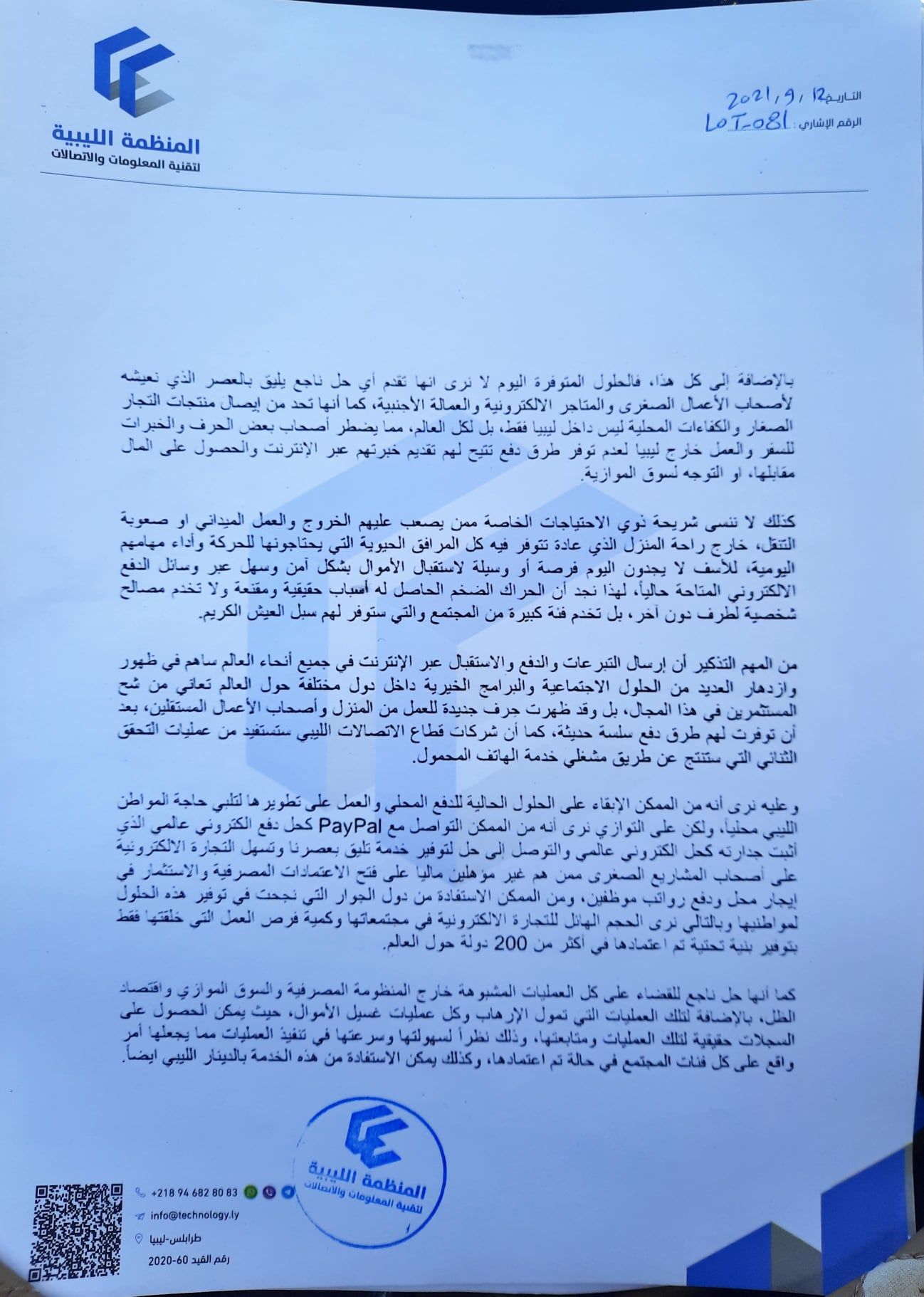

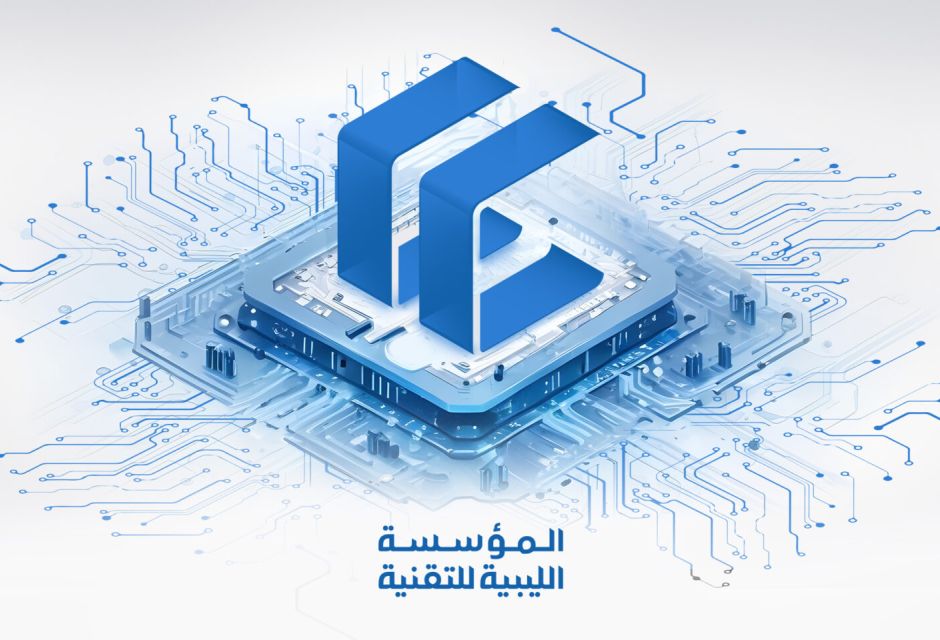
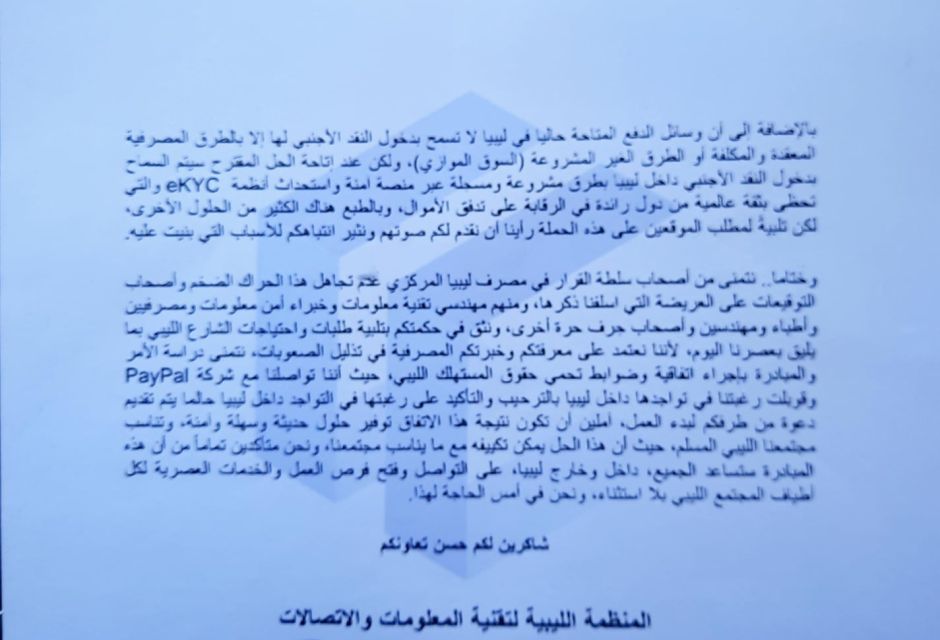
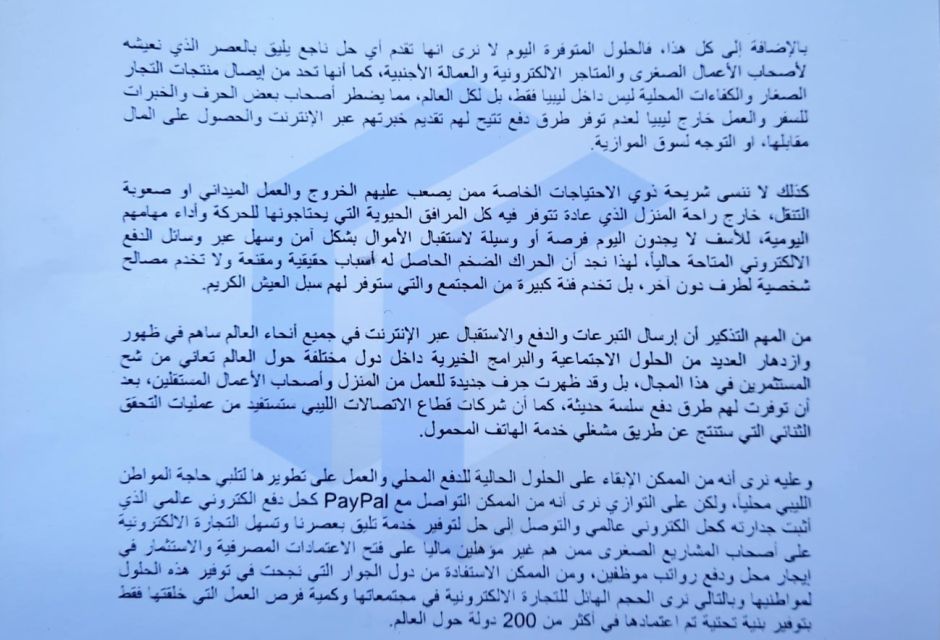
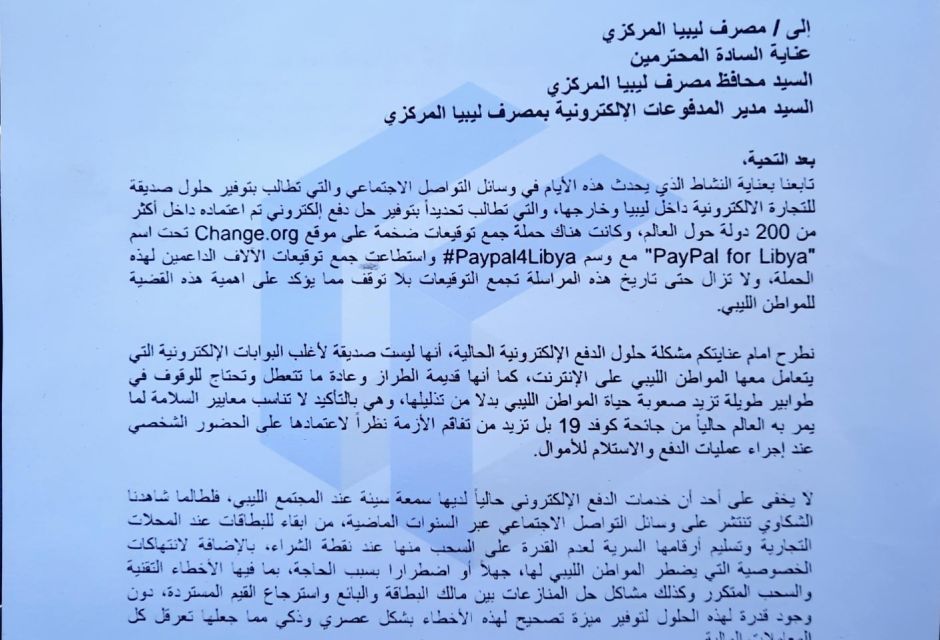
Leave a Reply